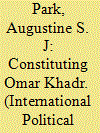| Srl | Item |
| 1 |
ID:
130986


|
|
|
|
|
| Publication |
2014.
|
| Summary/Abstract |
Until 2012, Omar Khadr was both the only former child soldier and Western national left in Guantanamo Bay. Captured by US forces at the age of 15, this Canadian youth would spend more than 40% of his life in US custody during the War on Terror. This article advances two key arguments. First, as a child soldier, Khadr is simultaneously cast as an object of sympathy and suspicion. The construction of Khadr's childhood is animated by a cultural racism, which casts Khadr as both a victim of an extremist family and the evil outcome of a "jihadi" upbringing. Second, this article examines competing culturally racialized claims about citizenship, prompted by the failure of the Canadian government to seek Khadr's repatriation. While the central preoccupation of liberal citizenship discourse is the erosion of Canada's identity as a Western, liberal democracy, "racial-nationalist" discourse raises the alarm on the threat posed by "citizens of convenience" who must be cast out of the polity through practices of "pure exclusion."
|
|
|
|
|
|
|
|
|
|
|
|
|
|
|
|
| 2 |
ID:
102037


|
|
|
|
|
| Publication |
2011.
|
| Summary/Abstract |
Studies of the post-colonial state have often presented it as a structure that has fallen under the control of self-interested sections of the Indian elite. In terms of citizenship, the failure of the state to do more to realize the egalitarian promise of the Fundamental Rights, set out in the Constitution of 1950, has often been attributed to interference by these powerful elite. Tracing the interplay between debates about Hindu property rights and popular support or tolerance for the notion of individual, liberal citizenship, this paper argues that the principles espoused in the Fundamental Rights were never neutral abstractions but, long before independence, were firmly embedded in the material world of late-colonial political relations. Thus, in certain key regards, the citizen-subject of the Indian Constitution was not the individual, freed from ascriptive categories of gender or religious identity, but firmly tied to the power structures of the community governed by Hindu law.
|
|
|
|
|
|
|
|
|
|
|
|
|
|
|
|